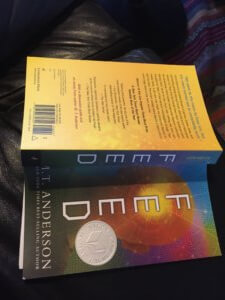Posts Tagged ‘technology addiction’
FEED, A No Spoiler Book Review
 Feed
Feed
By M.T. Anderson
A Book Review Without Spoilers
My daughter took a Dystopian Young Adult Literature class at her university a few years back. She took it for fun because though she was an architecture student, she loved to read fantasy, science or dystopian fiction. FEED was on the syllabus and after reading it for class, she handed it to me. “Mom, you have to read this book.”
When your kid hands you a book with that recommendation, you ought to respond, so I began to read…The first line of this novel grabbed me. It has to be one of the best EVER in the history of YA or scifi…
We went to the moon to have fun, but the moon turned out to completely suck.
However, after that first line, I almost didn’t make it past the first chapter. The narrator grated on me. The story is told from the first person point of view of a spoiled and entitled older teen male. Initially, I wasn’t sure I wanted to read his story, but I kept on, glancing a glimmer of hope for this character as I pushed through my angst. I saw how MT Anderson was using this vantage point to get under my skin…after all, much of the western world falls into the category of entitled, wealthy and spoiled. I decided that rather than distancing myself from this character, I ought to learn from his journey.
FEED is mostly a YA dystopian novel, but spills over into science fiction because of the futuristic tech and those initial scenes on the moon.
In recent months, I have recommended this story to more people than any other book I have read in the last 10 years. Why? FEED is good enough to hand over to a 13-year-old and a 52-year-old and if you are a parent, please read it and discuss it with your teen. Talk honestly about how we are connected to our devices.
FEED projects a future where children are connected to the web via the brain at a very early age. In the story world, the connection is called the feed. The practical science of how this takes place is never detailed, but it becomes clear that those with the feed maintain major economic, educational and social advantages. The story also shows the consequences of our planet devastated by greed and consumption. Oceans are dead, meat is genetically grown without the need for an actual animal and those who have money spend it on pure entertainment.
Titus, the teen protagonist and the narrator, lives at the top of this food chain. Initially, Titus seems utterly narcissistic. He and his friends battle boredom by pursuing short bursts of entertainment in whatever form available (almost always for purchase and provided by the feed). Titus slowly emerges as a deeper character, as someone hoping for authentic intimacy and friendship. Within his social class, it seems there are no guides to help him. Even his family is devoid of warmth and affection. For example, Titus never calls his little brother by his name, but refers to him throughout the story as Smellfactor. He treats his brother as an object of inconvenience, someone to ignore and avoid. Within Titus’ social circle, there is every indication that his family is normal.
While on the Moon, Titus meets Violet. Initially, physical attraction drives his desire to be with her, but when an event disconnects Titus, his group of his friends and Violet from the feed for a few hours, their bond takes on a deeper hue. Violet is not from his social class and was not connected to the feed at the earliest age possible. Her hippy, intellectual parents resisted putting the feed in her brain for as long as they were able, homeschooling her for a time (since education happens via the feed). As a result, Violet knows about the world in ways Titus and his friends don’t. She has developed critical thinking skills and keeps current on news, including the broad unrest that is taking place across the globe.
Violet isn’t lost without her feed, as are the others, including Titus. She asks questions, she makes observations, she opens Titus’ eyes to the way the feed manipulates, limits and traps those who are connected. Titus finds her views compelling and true, yet he resists her as well. Titus is less of a hero than we might hope, but he does attempt in his own way to move toward knowledge and depth. This makes for a potent story.
FEED poses so many questions that are worth asking. I won’t spoil the finale, but there is a poetic vision that lends itself to pondering and, as I said…a great discussion.
This book is a quick read. Do hand it out to your children and grandchildren. Do make it a present to your nieces and nephews. Do read it yourself, so you can quietly draw out the conversation that needs to take place in our society…TODAY if not yesterday.
If you need questions for starting a discussion, see my post FEED, by M.T. Anderson Discussion Questions for Educators
To buy this amazing book, click here.
